Major new system and result from the team: SOAR is an open-source self-improving genAI system pushing the frontier of ARC performances using program synthesis
It relies on using LLMs as self-improving smart operators for evolutionary search
16.07.2025 15:25 — 👍 3 🔁 0 💬 0 📌 0
Congratulations @jul-p.bsky.social for this major achievement and @ccolas.bsky.social for the amazing co-supervision ! Your work was magic to develop this self-improving system pushing the frontier of what can be done with program synthesis and open-source methods and models on the ARC challenge !
16.07.2025 15:24 — 👍 2 🔁 0 💬 0 📌 0
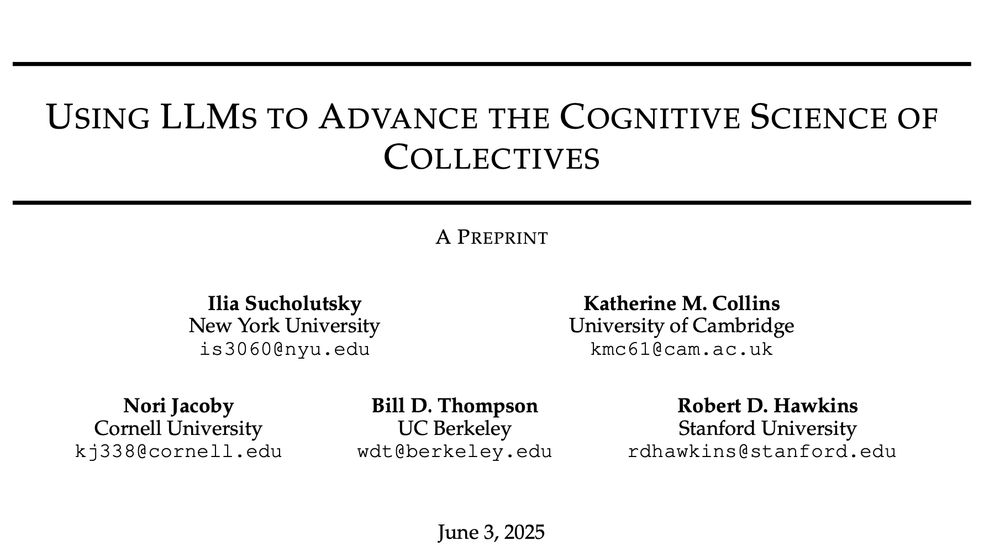
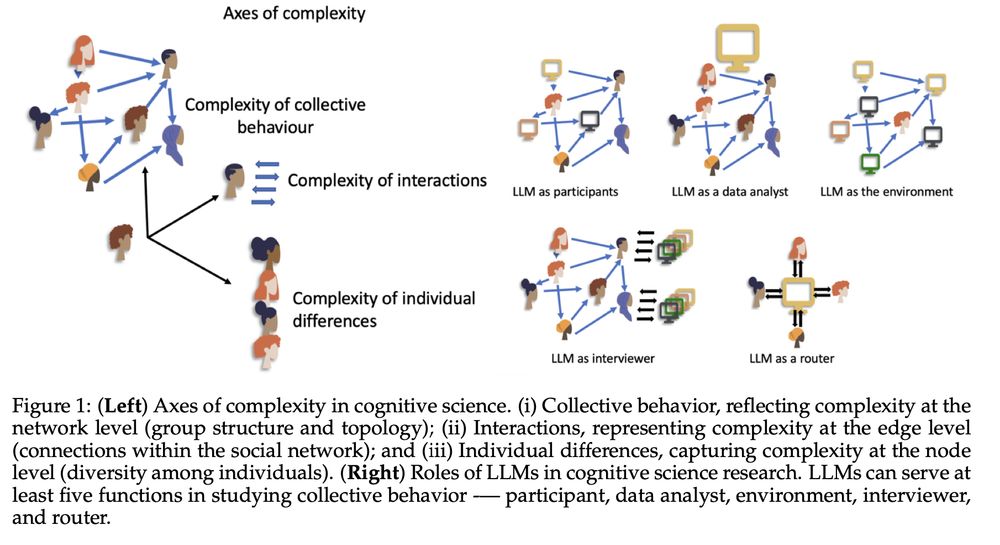
Using LLMs to advance the cognitive science of collectives
Very interesting new paper by @sucholutsky.bsky.social
Katherine Collins @norijacoby.bsky.social @billdthompson
@roberthawkins.bsky.social
arxiv.org/pdf/2506.00052
10.06.2025 12:18 — 👍 2 🔁 0 💬 0 📌 0
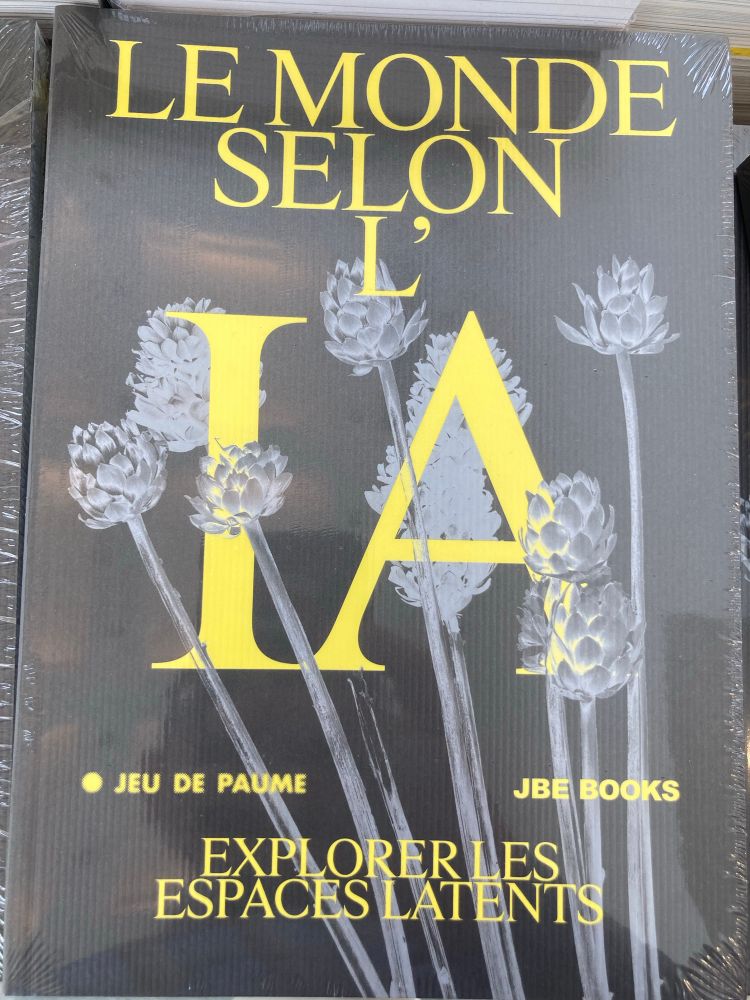
Catalogue de l’expo « Le monde selon l’IA »
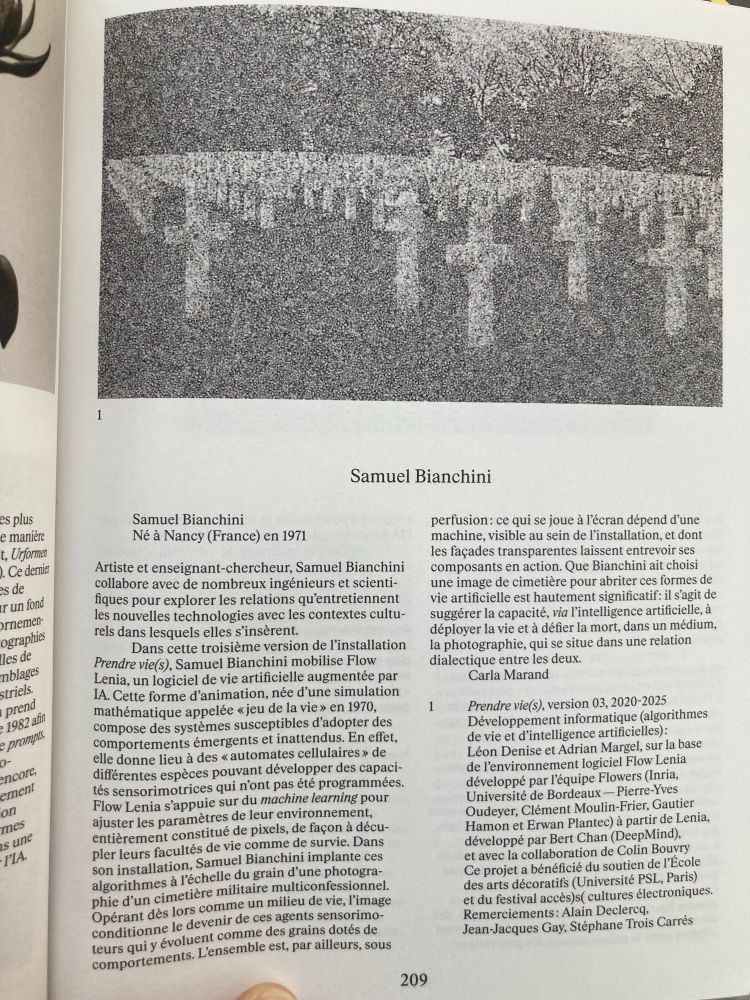
Artiste et enseignant-chercheur, Samuel Bianchini collabore avec de nombreux ingénieurs et scientifiques pour explorer les relations qu'entretiennent les nouvelles technologies avec les contextes culturels dans lesquels elles s'insèrent.
Dans cette troisième version de l'installation Prendre vie(s), Samuel Bianchini mobilise Flow Lenia, un logiciel de vie artificielle augmentee par IA. Cette forme d'animation, née d'une simulation mathématique appelée «jeu de la vie » en 1970, compose des systèmes susceptibles d'adopter des comportements émergents et inattendus.
Prendre vie(s), version 03, 2020-2025
Développement informatique (algorithmes de vie et d'intelligence artificielles):
Léon Denise et Adrian Mangel, sur la base de l'environnement logiciel Flow Lenia développé par l'équipe Flowers (Inris.
Université de Bordeaux - Pierre-Yves
Oudeyer, Clément Moulin-Fricr, Gautier Hamon et Erwan Plantee) à partir de Lenis. développé par Bert Chan (DeepMind). et avec la collaboration de Colin Bouvry Ce projet a bénéficié du soutien de l'École des arts décoratifs (Université PSL, Paris) et du festival accès)s( cultures électroniques
Remerciements: Alain Declercq.
Jean-Jacques Gay. Stéphane Trois Carrés
Le travail de Samuel Bianchini à partir des algorithmes de @pyoudeyer.bsky.social mis en lumière par le Jeu de paume dans son expo IA
06.06.2025 16:28 — 👍 3 🔁 1 💬 1 📌 1

FLOW LENIA
Erwan Plantec, Gautier Hamon, Mayalen Etcheverry, Pierre-Yves Oudeyer, Clément Moulin-Frier, Bert Wang-Chak Chan�Inria Flowers and Google Deepmind
Merci pour le lien ! Pour être plus précis, ce sont les algorithmes développés par des membres de mon équipe, ici en particulier @eplantec.bsky.social @clemmoulinfrier.bsky.social @hamongautier.bsky.social et le système Flow Lenia sites.google.com/view/flowlen...
10.06.2025 12:15 — 👍 3 🔁 0 💬 0 📌 0
guydavidson.me/files/goal_i...
28.05.2025 14:20 — 👍 5 🔁 0 💬 0 📌 0
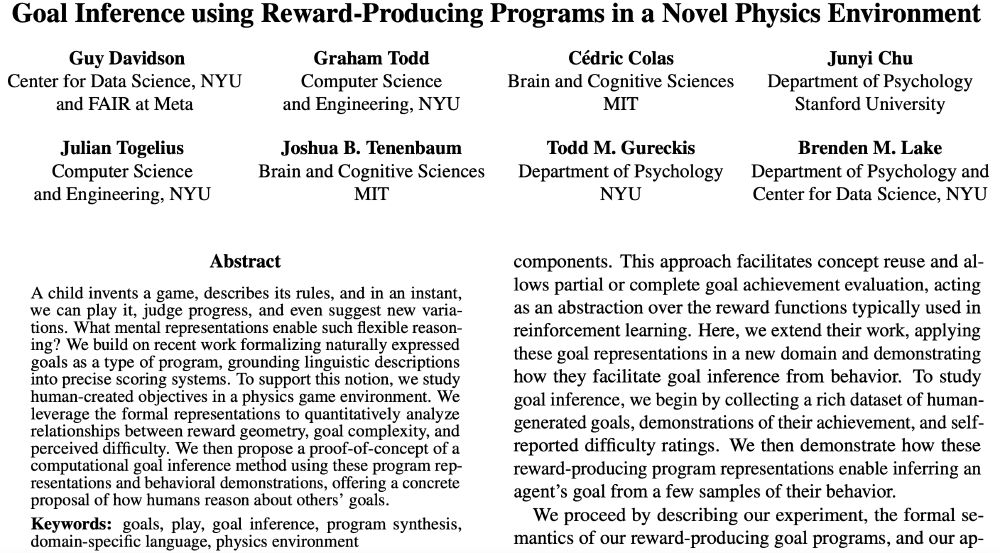
Humans' ability to invent their own games & goals is at the core of open-ended learning.
Understanding and modeling computationally how they do it would be enlightening to understand better human cognition and build open-ended AI
Great step in this direction in new paper by Guy Davidson et al.
28.05.2025 14:20 — 👍 19 🔁 4 💬 1 📌 0
I reviewed "These Strange New Minds: How AI Learned to Talk and What It Means" by Chris Summerfield.
melaniemitchell.me/EssaysConten...
19.05.2025 18:36 — 👍 47 🔁 11 💬 1 📌 3
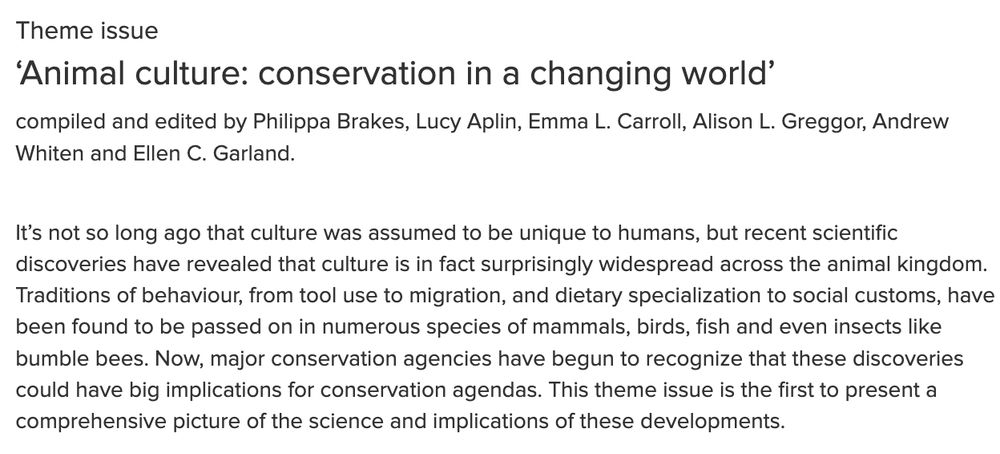
royalsocietypublishing.org/toc/rstb/202...
15.05.2025 11:47 — 👍 3 🔁 0 💬 0 📌 0
Cool
15.05.2025 11:40 — 👍 5 🔁 0 💬 0 📌 0
Another one.
09.05.2025 21:19 — 👍 4 🔁 1 💬 0 📌 0
Here is a cool Flow-Lenia simulation, which is a continuous cellular automaton with two distinct features:
1. Mass conservation - sum of all activations is constant through time
2. Localized update rules - enables simulations with differently behaving matter on the same grid
09.05.2025 21:17 — 👍 19 🔁 9 💬 1 📌 1
Very happy that our paper received both the EvoApps best paper and the EvoStar best student paper! Congrats team!!
Emergent Kin Selection of Altruistic Feeding via Non-Episodic Neuroevolution
arxiv.org/abs/2411.10536
12.05.2025 15:45 — 👍 11 🔁 4 💬 0 📌 0
Check out @nicolasyax.bsky.social
thread about our paper (co-supervised by @pyoudeyer.bsky.social) where we show that evolutionary tree reconstruction can be successfully applied to map LLMs to map relations and predict their performance! Currently at @iclr-conf.bsky.social
29.04.2025 11:38 — 👍 4 🔁 1 💬 0 📌 0
And thank you @gaiamolinaro.bsky.social for presenting the work ! + thanks Jérémy Perez for leading the project and thanks the whole team Corentin Leger
@kovacgrgur.bsky.social @ccolas.bsky.social
@clemmoulinfrier.bsky.social
@maximederex.bsky.social
25.04.2025 13:41 — 👍 2 🔁 0 💬 1 📌 0
Generative AI is a cultural transmission technology:
it plays a growing role in generation, selection and transmission of ideas/opinions in human society 🧠🔄🌐
And yet we understand very little of this dynamics at this point 🤔❓
A step forward is our #ICLR2025 paper !👇
25.04.2025 13:41 — 👍 7 🔁 1 💬 1 📌 0
@thomwolf.bsky.social This is the HF space we discussed, allowing to map the space of all models on HF, and infer which derive from where :)
24.04.2025 13:47 — 👍 0 🔁 0 💬 0 📌 0
Congratulations @nicolasyax.bsky.social for the amazing work, and @stepalminteri.bsky.social for the co-supervision !
24.04.2025 13:46 — 👍 2 🔁 1 💬 0 📌 0
I have to say that when Nicolas pitched us the idea of this project, I was excited about the creativity, but was not convinced it would work: I was completely wrong, it worked close to directly! Beautiful!
24.04.2025 13:22 — 👍 0 🔁 0 💬 0 📌 0
Imagine you can compute a (very) cheap behavioural signatures for LLMs and from it
1) infer their history (which previous models they derived from)
2) build large maps to navigate spaces of 100s of models
3) predict (coarsely) their performances in benchmarks
That's PhyloLM 🚀
24.04.2025 13:21 — 👍 1 🔁 0 💬 0 📌 0
We are starting a new major research project investigating the joint development of curiosity and metacognition in adolescents, where the Flowers lab will collaborate with @mjgruber.bsky.social 's lab at Univ. Cardiff, and Yana Fandakova at Univ. Trier !!! Open postdocs positions, see below 👇
16.04.2025 09:54 — 👍 6 🔁 1 💬 0 📌 0
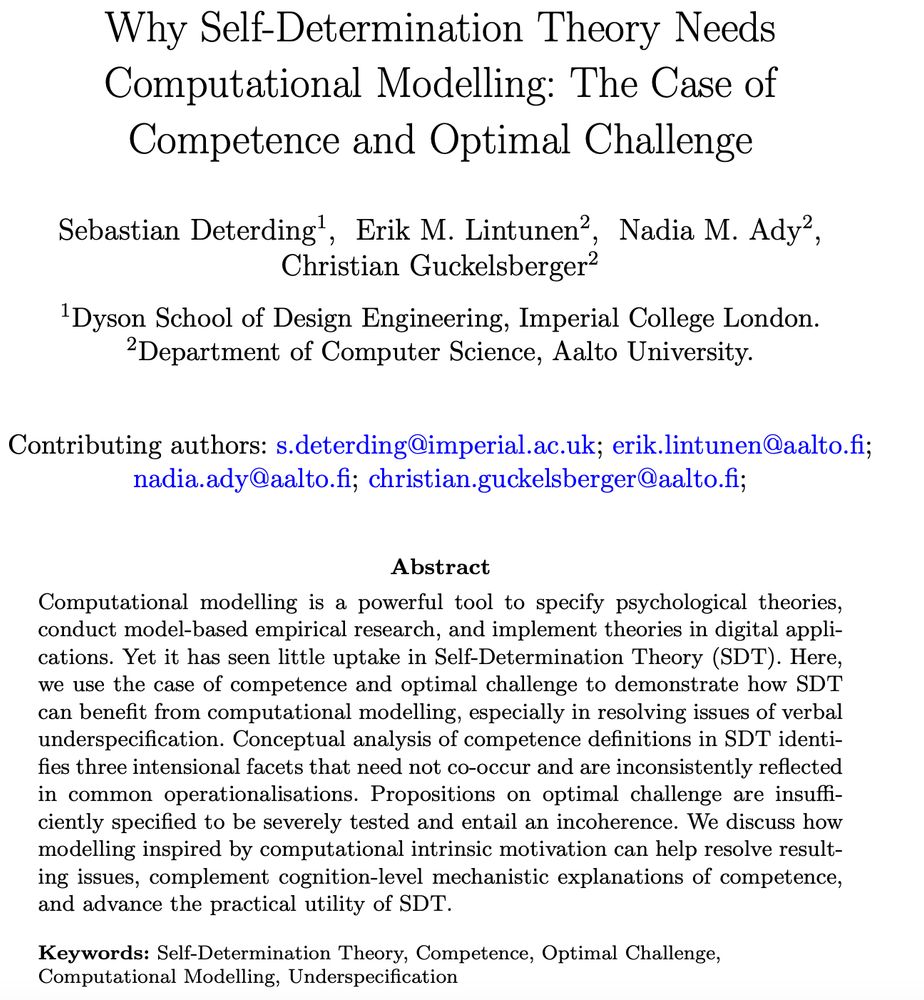
Why Self-Determination Theory Needs Computational Modelling: The Case of Competence and Optimal Challenge
by @codingconduct.cc E. Lintunen N. Aly @creativeendvs.bsky.social
osf.io/n6x8s/downlo...
10.04.2025 13:24 — 👍 2 🔁 1 💬 0 📌 0
Thanks @ccolas.bsky.social for pointing it out ! This has great potential for diversity search algorithms
03.04.2025 09:15 — 👍 1 🔁 0 💬 0 📌 0
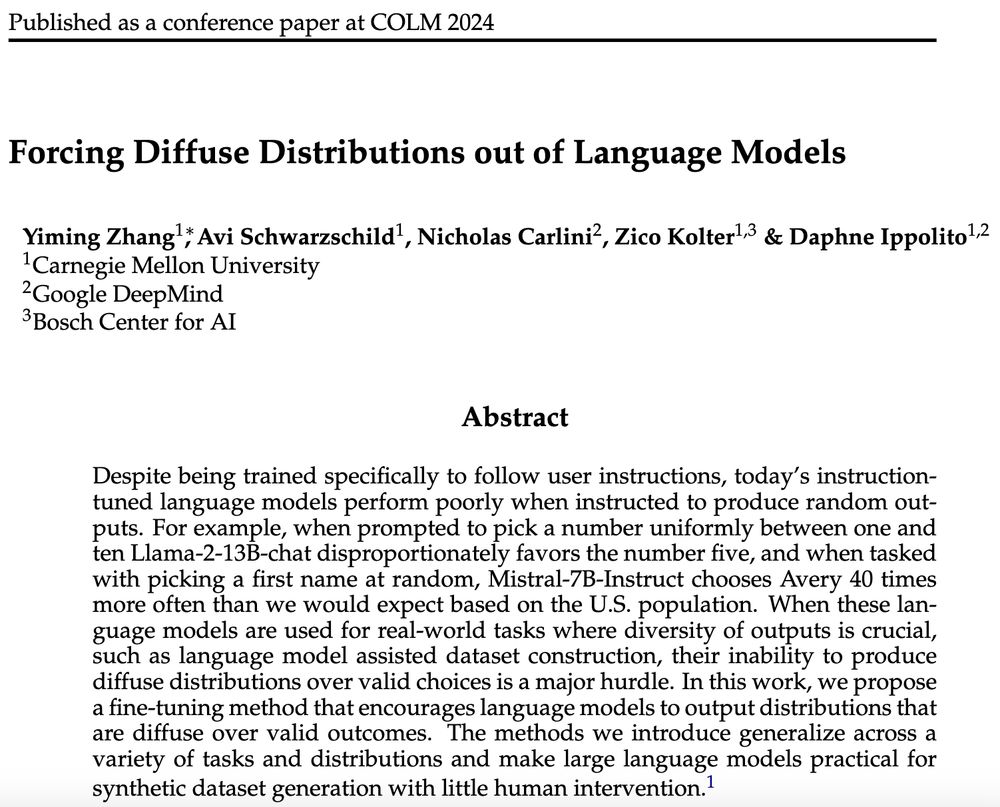
Forcing Diffuse Distributions out of Language Models
"When LLMs are used for real-world tasks where diversity of outputs is crucial their inability to produce
diffuse distributions over valid choices is a major hurdle"
New method to address this challenge by Zhang et al.:
arxiv.org/pdf/2404.10859
03.04.2025 09:15 — 👍 3 🔁 1 💬 1 📌 0
Interesting discussions, thanks for sharing ! As Pessoa and Sejnowski argue, multimodal brain-behaviour-environment in natural contexts would be key in this perspective
26.03.2025 17:33 — 👍 1 🔁 0 💬 0 📌 0
OSF
"The Appeal of Insight: Why Riddles and Whodunits Captivate Us" - These studies contribute to a growing literature in which the cultural success of fictional stories is explained by their ability to tap into specific cognitive mechanisms.
osf.io/preprints/ps...
26.03.2025 06:44 — 👍 10 🔁 4 💬 1 📌 0
Extreme stances about AI and LLMs in particular (be them deflationary or inflationary) are very likely wrong, valid and certainly not good for an healthy debate. But where do they come from? We (with @giadapistilli.com) argue that common cognitive biases may play a role:
osf.io/preprints/ps...
26.03.2025 07:33 — 👍 12 🔁 7 💬 0 📌 0
Humans excel at estimating their own competence and progress on tasks. But can LLM agents do the same?
With 🧭MAGELLAN, our agent predicts its own learning progress across vast goal spaces, even generalizing to new tasks!
📄Paper: arxiv.org/abs/2502.07709
24.03.2025 19:53 — 👍 2 🔁 1 💬 0 📌 0
PhD student at INRIA (FLOWERS team) working on LLM4code | Prev. (MVA) ENS ParisSaclay
AI & CV scientist, CEO at @kyutai-labs.bsky.social
Données de recherche et #dataESR @univbordeaux.bsky.social. Co-fondateur @cafe-sciences.org et Deuxième labo. Administrateur @assotraces.bsky.social. #OpenData #OpenScience
Également sur Mastodon : @enroweb@qoto.org
He/him
I teach C++ & computer graphics and make videogames
Working on a medieval village building game: https://youtube.com/playlist?list=PLSGI94QoFYJwGaieAkqw5_qfoupdppxHN&cbrd=1
Check out my cozy road building traffic sim: https://t.ly/FfOwR
PhD candidate at Monash University
Interested in curiosity and decision-making 🧠
Senior Research Scientist.
Prev Postdoc @ Mila, PhD @ Polytechnique Paris.
Interested in large-scale continual learning, representation learning, SSL and LLMs.
machine learning researcher @Apple | PhD from @CoML_ENS | speech, ml and cognition.
Researcher at Inria. Simulating the origins of life, cognition and culture. Using methods from ALife and AI.
Publications: https://scholar.google.com/citations?hl=en&user=rBnV60QAAAAJ&view_op=list_works&sortby=pubdate
Prev. posts still on X same username
💻Computer Scientist🖼Art Historian👨🏫Prof in Creative Tech @Aalto University (Finland). Bridging AI/HCI/CogSci/Creative Practice to research creative AI.
The funder-researcher collaboration and open-access publisher for research in the life and biomedical sciences.
Follow @eLifeCommunity.bsky.social
Perceptual decision making, visual metacognition, computational cognition, cognitive neuroscience, neuroAI. Associate professor at Georgia Tech. Director of Computations of Subjective Perception lab: https://rahnevlab.gatech.edu
assoc prof, uc irvine cogsci & LPS: perception+metacognition+subjective experience, fMRI+models+AI
phil sci, education for all
2026: UCI-->UCL!
prez+co-founder, neuromatch.io
fellow, CIFAR brain mind consciousness
meganakpeters.org
she/her💖💜💙views mine
Computational neuroscientist at Imperial College. I like spikes and making science better (Neuromatch, Brian spiking neural network simulator, SNUFA annual workshop on spiking neurons).
🧪 https://neural-reckoning.org/
📷 https://adobe.ly/3On5B29
UCL NeuroAI fosters collaboration between our neuroscience and AI communities. https://www.ucl.ac.uk/research/domains/neuroscience/ucl-neuroai
Cognitive science PhD student at Stanford, studying iterated learning and reasoning.
Prof: Rutgers; Program Manager: DARPA; Scientist-at-Large: Redpoll.
Math! Machine learning! Cognitive Science!











